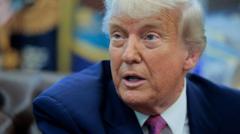In an interview, Donald Trump indicated he would assess Vladimir Putin's sincerity in negotiations regarding Ukraine within two weeks, showcasing his discontent over Russia's intensified military actions.
Trump Sets High-Stakes Ultimatum for Putin on Ukraine Situation

Trump Sets High-Stakes Ultimatum for Putin on Ukraine Situation
In a pivotal moment, Trump signals a deadline for Russia's actions amid escalating attacks on Ukraine.
Trump's comments come after Russia conducted some of its most devastating attacks on Ukraine in recent history, raising concerns over the conflict's trajectory and America's response to Moscow's aggression.
Trump's remarks during a Wednesday press meeting in the Oval Office suggested an urgent timeline for evaluating Putin's intentions. With the Russian offensive ramping up, Trump reflected a growing impatience regarding the war's negotiation process, stating, "Within two weeks, we're going to find out whether or not (Putin is) tapping us along or not." His escalation of public criticism—branding Putin as "absolutely crazy" and "playing with fire"—reflects increasing frustrations, especially after several months of diplomatic engagement and failed negotiations.
Despite Trump's assertive claims, the Kremlin's military actions remain unabated, with recent strikes in Kyiv resulting in fatalities and injuries to civilians. The ongoing conflict has persisted into its fourth year, with numerous calls for ceasefire yielding limited results. Trump's previous phone call with Putin, which he deemed "very productive," did not result in any substantial peace agreement, as evidenced by Russia's sustained military strikes.
The U.S. administration has come under scrutiny for its approach to handling Russia, with critics arguing that it has inadvertently emboldened the Kremlin. Trump's own track record, marked by a temporary suspension of military aid to Ukraine during his presidency, raises questions about U.S. commitment to European allies in the face of Russian aggression. While the Biden administration has maintained sanctions against Russia, its strategy of negotiation seems less effective against ongoing conflict.
In light of these tensions, European leaders are stepping in, with Germany's new chancellor pledging support to Ukraine in developing long-range missile capabilities. Any shift in this military balance risks inciting further strife with Russia, which condemns such moves as threats to peace negotiations.
As the situation evolves, Trump's demand for a summit with Putin marks a pivot from earlier efforts for an immediate ceasefire. Yet, Russia's escalating conditions—such as territorial concessions from Ukraine—adds complexity to prospective talks, leading to speculation that Moscow is creating scenarios that are impossible for Kyiv to accept, thereby shifting blame onto Ukraine.
With the war continuing to ravage parts of the country, this conflict has inflicted heavy tolls on human lives and infrastructure. The question remains whether impending American pressure will alter Putin's calculus or merely serve as a political tactic in Trump's historical dialogue with the Russian leader.
Trump's remarks during a Wednesday press meeting in the Oval Office suggested an urgent timeline for evaluating Putin's intentions. With the Russian offensive ramping up, Trump reflected a growing impatience regarding the war's negotiation process, stating, "Within two weeks, we're going to find out whether or not (Putin is) tapping us along or not." His escalation of public criticism—branding Putin as "absolutely crazy" and "playing with fire"—reflects increasing frustrations, especially after several months of diplomatic engagement and failed negotiations.
Despite Trump's assertive claims, the Kremlin's military actions remain unabated, with recent strikes in Kyiv resulting in fatalities and injuries to civilians. The ongoing conflict has persisted into its fourth year, with numerous calls for ceasefire yielding limited results. Trump's previous phone call with Putin, which he deemed "very productive," did not result in any substantial peace agreement, as evidenced by Russia's sustained military strikes.
The U.S. administration has come under scrutiny for its approach to handling Russia, with critics arguing that it has inadvertently emboldened the Kremlin. Trump's own track record, marked by a temporary suspension of military aid to Ukraine during his presidency, raises questions about U.S. commitment to European allies in the face of Russian aggression. While the Biden administration has maintained sanctions against Russia, its strategy of negotiation seems less effective against ongoing conflict.
In light of these tensions, European leaders are stepping in, with Germany's new chancellor pledging support to Ukraine in developing long-range missile capabilities. Any shift in this military balance risks inciting further strife with Russia, which condemns such moves as threats to peace negotiations.
As the situation evolves, Trump's demand for a summit with Putin marks a pivot from earlier efforts for an immediate ceasefire. Yet, Russia's escalating conditions—such as territorial concessions from Ukraine—adds complexity to prospective talks, leading to speculation that Moscow is creating scenarios that are impossible for Kyiv to accept, thereby shifting blame onto Ukraine.
With the war continuing to ravage parts of the country, this conflict has inflicted heavy tolls on human lives and infrastructure. The question remains whether impending American pressure will alter Putin's calculus or merely serve as a political tactic in Trump's historical dialogue with the Russian leader.





















